Peter MALONE
Saturday, 18 September 2021 19:43
Silkwood
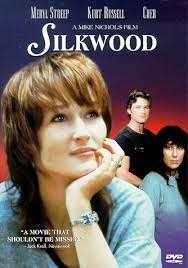
SILKWOOD
US, 1983, 130 minutes, Colour.
Meryl Streep, Kurt Russell, Cher, Craig T. Nelson, Sudie Bond, Ron Silver.
Directed by Mike Nichols.
Silkwood is a dramatising and an interpretation of events in the life and the death of Karen Silkwood, a worker in the Kerr-McGee? plant in Oklahoma, processing uranium. An ordinary young woman from Texas, she left her de facto husband and three children and moved to work in Oklahoma. Involved in union activities in the plant, she campaigned and worked for exposure of cover-ups in the processing of plutonium. As she was about to give information to a New York Times journalist, she was involved in a car accident and died. The screenplay steers
clear of stating what happened to Karen Silkwood, avoiding possible libel suits. However, the film indicates that there could be many interpretations of Karen Silkwood's death - her poor health and tension, possible sabotage.
The film was released in the atmosphere of anti-nuclear films like The Day After and Testament. Meryl Streep, after her performance in Sophie's Choice, is excellent in the role of Karen Silkwood, portraying her ordinariness as well as the qualities which led her to be involved in anti-nuclear work and for her to become something of a folk hero in the late '70s in the U.S. She is well-supported by Kurt Russell and Cher in an Oscar-nominated performance. Direction is by Mike Nicholls, prominent stage director and comic writer. His few films include Who's Afraid of Virginia Woolf, The Graduate, Catch 22, Carnal Knowledge. The film works very well indeed as a human drama. It is important as a dramatisation of industry, the needs for safe
guards in the processing of uranium and the repercussions of radioactivity. Scenes with Thelma (Sudie) Bond and Karen being scrubbed are most moving and frightening. The film is a timely warning as well as good drama.
1 The quality of the film? Its acclaim? Impact?
2. The work of the director and his theatre work, films? The strength of the cast? The film as a combination of cinematic skills? Sense of humanity? Message?
3. The background of Oklahoma and Texas: the countryside, the drab landscapes, the beauty, homes, the plant? The contrast with the Washington sequences? An atmosphere of authenticity? The '70s.-The pace of the film - different for the various moods and the drama? The musical score by Georges Delerue? The use of 'Amazing Grace' and the interweaving of other hymn themes?
4. The impact of Karen Silkwood in the '70s? Her work, the nuclear questions, the situation at Kerr-McGee?, her interventions, the mysteriousness of her death? Her reputation and becoming a significant American heroine? The dramatisation and interpretation of 1974? The relative importance of accuracy? The importance of the validity of the interpretation? The care of the screenplay as regards possible libel suits, action by Kerr-McGee? The-way of suggesting various hypotheses for Karen Silkwood's death?
5 The quality of the film as a dramatisation of a person, her experience, her involvement in issues?
6 Karen SiIkwood? as an ordinary person, her faults, inadequacies, strengths? Her humanity, intelligence? Hex experiencing dissatisfaction, her gradual involvement in issues, the union work, jobs for the union, investigations - and their consequences? Dangers? The significance and influence of an ordinary person becoming involved?
7. The anti-nuclear urgency of the film? The focus on uranium and plutonium treatment rather than on bomb production, the dropping of bombs? The dangers of uranium mining, the details of processing? Human error, machine error, cover-ups? The importance of production and contracts, big money? he use of time and urgency on workers? The comparisons with other issues in American industry (miners and dangers in air pollution in mines, chemical inhalation), the safeguards and action? The issues presented humanly - audiences identifying with the person and the issues - pro or con? The call to action?
8. The introduction to Kerr-McGee? plant via the three arriving, the interrelationships amongst the workers, their talk, the old man with his religion and miracles, the crude jokes and the laughter, time off, meals, the clashes? Prejudices - Thelma and black people? The group work together, the workers liking their job? The atmosphere of the plant, technology? the new recruits being shown round, Karen explaining? Carelessness in checking for radio-activity - Karen's carelessness and the others' reaction?
9. The personnel at Kerr-McGee: Hurley and his supervision, the pressure for continued work - his intrusion with Gilda's presents and birthday cake? Mistakes, Thelma and her radioactivity and the scrubbing? The workers ignorant of various details of the plant and issues? Karen and the first radioactivity, the scrubbing, the being transferred? Winston and his liking his job, his touching up the photos? Karen trying to expose this cover-up?
10. Meryl Streep's qualities of acting as Karen? Karen as a person who liked people, liked being in their company? With Drew, her love for him, ease at home? Intimacy? The strong friendship with Dolly? Her ringing her mother, her greetings to her father? Relying on her mother - for hair conditioner etc.? Her concern for her children: the drive, the visit, Peter's hesitance, Linda waiting with Karen, Drew and Dolly? Her relationship with her kids, not wanting to swear, the take-away eats, her not being able to see them for the weekend? Her adequacies and inadequacies as a mother? The story of her going off with Peter, too young to marry, de facto relationship, divorce - and the law applying to de facto relationships, common law? Her inability to look after her children yet her tenderness? Dolly's comment on the similarity of her treatment of Drew?
11. Kurt Russell's presence as Drew? His skills at work, love for Karen, their friendship and love, the intimacy of their scenes together - ease, taking one another for granted, love? His work on cars? His reaction to Angela with Karen? His reaction to Karen's involvement in union work, always being on the phone? His seeing the slides and her being with Paul in the photos? His decision to go - seeing Karen as two people, loving one and not being able to deal with the other? His own self-assertion and success? His coming to help Karen after the accident? Moving in - and the possibility of a future? His reaction to the radio-activity of the house? The encounter with Winston and punching him? The tenderness of the final farewell to Karen?
12. The sketch of Dolly and Cher's presence? Being part of the group, seeing her at work, in the home, the drive to Texas, her loneliness, crankiness - and Karen's reaction to sandwiches in the fridge? Being part of the house? The presence of Angela - the relationship, the sequence of the make-up, their friendship, the bonds? Her anger with Karen after Angela left? Her declaration of love for Karen? The portrait of a woman, the empathy for the lesbian?
13. Angela - her arrival, appearance, the background of her work, style, make-up, the corpses, her advice, her reaction to Drew's jokes, her going? A sign of contradiction in the house? Her remarks about the Kerr-McGee? dead - as dead before they were dead?
14. The background of the union, the meetings, the need for votes? Karen at the meetings, volunteering? Her reading the literature? Her work as a representative - Hurley and inviting the blood donor van? Working with ffinston? Her going to Washington, the problem with the dress, enjoying the plane ride, the photos, the interviews, her information about the cover-up of the negatives? The response of the authorities? The friendship with Paul - and the relationship? The slides afterwards and Drew's reaction? The plans, the phone calls to Paul, his not answering and her exasperation, loneliness? Paul's visit and the talks, the night together? The success of the vote? Karen involved, taking notes, the hostile reaction of the co-workers, Gilda and her suspicions and reaction, her looking at the photos, Winston catching her and the story of the pills. Morgan and his warning? Thelma and her help?
15. Karen's enjoyment of her involvement - the impact of Washington, the notebook? Yet the response to the radio-activity - the scrubbing, the urine sample, her being caught twice, the crash and its effect on her? Her illness, pills? Drew and Dolly and their reaction after the accident? Her being almost caught with her investigations, the final scrubbing, the demolishing of the house? This as a turning point? Hurley and his wanting her to sign? Her decision about the interview - her farewell?
16. The radiation themes: the burning, Thelma and the scrubbing, the nasal smear, Karen and the experience, the poison and cancer? The speedy destruction of everything in the house? The three going to Los Alamos and the tests, the information? The speech by the doctor about the proportion of plutonium radiation?
17. The supporting cast: Thelma, her wig, scrubbing, her reaction to the black person next to her dying daughter, her questions at the meeting, her supplying Karen with documentation, her grief after the accident? Gilda and her friendship, the gift, suspicions, liking her job? Morgan and the jokes - and his going to Washington? The old man and his religion? The range of workers? Their presence at the meetings, the questions about radiation?
18. Washington, the celebrations, the union official, the interviews? Paul and his following up the case? Documentation and newspaper exposes?
19. Winston and his work, cover-up, his comments about the risks, his comments about losing jobs (and the irony of the closure of the plant soon after)? Drew's punching him?
20. Karen and the singing of 'Amazing Grace' - after her visit to her children, at the end? The repetition of her farewell and the crash? The pathos of the crash? Thelma's shock? The final information about Karen Silkwood, her death, the closure of the plant?
21. A satisfying human drama, message film?
Published in Movie Reviews
Published in
Movie Reviews
Tagged under
Saturday, 18 September 2021 19:43
Seven Days to Noon
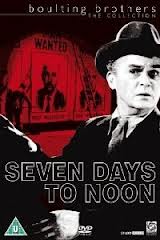
SEVEN DAYS TO NOON
UK, 1950, 94 minutes, Black and white.
Barry Jones, Olive Sloane, Andre Morell.
Directed by John Boulting.
Seven Days to Noon is considered something of a classic British thriller. It was directed by John Boulting, one of the celebrated Boulting Brothers who made a number of serious films in the 50s and then moved to satire in the late 50s with I'm All Right Jack and other films with Peter Sellers. In the aftermath of World War Two and the dropning of the atomic bomb on Hiroshima and Nagasaki, this kind of thriller of the Cold War period was particularly telling in its time. A mad scientist holds London to ransom. Barry Jones is effective as the pathetic mad scientist.
While the film has the elements of the horror thriller, the theme was topical in its day and has continued so in the subsequent decades, especially from the 60s onward with the focus in films on nuclear scares and the aftermath of the dropping of nuclear bombs. While the film is very much of its period, its universal theme is \ applicable to later audiences.
1. A good thriller, interesting and exciting?
2. The characteristics of the British thriller of 1950? The cinematic impact and style?
3. Britain in 1950 in terms of theme; post-war Britain, the atmosphere, people's expectations?
4. The film's background of the Cold War, the development of atomic bombs,'bomb threats? Did this film communicate what it was like to be fearful of bombs in 1950?
5. The film's background of science, science madness, the loneliness of the scientist; the anti-war theme via the mad scientist? How effective? How realistic?
6. The suspense structure of the film and its impact? The listing of the days, the emphasis on time, the professor's ultimatum?
7. Audience interest in and sympathy for the professor? Was he pre-judged insofar as we heard about him before seeing him? People's alarm at his behaviour without understanding him? His explanation for his actions? How credible were they? How mad was he? The background of his family, especially his daughter and wife? The explanation of his work, the presentation of his assistant? The growing obsession? The cunning, for example, at the barber's, eluding the posters and the newspapers? His encounter with the landlady and her fear? His pacing up and down and reflecting; the dramatic impact of this? His friendship with Goldie and staying at her house? His terrorising her? The final vision of him at prayer? How real a character?
8. The contrast of his daughter and his laboratory assistant? Their contribution to the human impact of the film? To the suspense?
9. The presentation of the inspector, the Prime Minister, the various police?
10. The presentation of the soldiers; eventually, the nervous soldier? How credible was it that he would shoot the professor?
11. The scenes of evacuation? How realistic? The impact of people at the time? Does this seem real?
12. The importance of Goldie? The fact that she stayed? The suspense from the soldiers not examining her room?
13. The ending and its suspense? How well handled? The emphasis on time, the co-ordination of the search parties?
14. How credible was the ending? The finding of the professor, the defusing of the bomb, the professor's death, Goldie trying to get away from London, the people returning?
15. The film is considered something of a masterpiece. Does it merit this? The value of its exploration of human and social themes?
Published in Movie Reviews
Published in
Movie Reviews
Tagged under
Saturday, 18 September 2021 19:43
Strategic Air Command
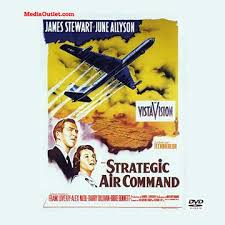
STRATEGIC AIR COMMAND
US, 1955, 114 minutes, Colour.
James Stewart, June Allyson, Frank Lovejoy, Barry Sullivan, Alex Nicholl, Brace Bennett.
Directed by Anthony Mann.
Strategic Air Command was one of eight films that James Stewart made with director Anthony Mann during the 50s. Most of them were westerns, pieces of Americana where Stewart was both hero and villain in turn. Others of the eight included Thunder Bay in which James Stewart was working for a large oil company and this film in which he is a veteran pilot of World War II who is called up in the 50s to test the new jets. The film is a real flag-waver in the spirit of the 150s. It made impact because of the presence of Stewart and June Allyson. (They had teamed in Mann's The Glenn Miller Story, another flag-waver and war memory of the period, and Sam Wood's baseball film The Stratton Story (1949)).
The film is fairly conventional in its presentation of its lanky hero, his memories of World War II, his adapting to the new technology of the '50s, his'romance with his affectionate and long-suffering wife. The military are presented fairly sympathetically but strongly - Frank Lovejoy's character's name is, ironically, General Hawkes! The film also has a score by Victor Young.
Strategic Air Command takes for granted America's supremacy and its need to maintain its arms and planes. Its screenplay highlights the argument for arms build-up as deterrence. There is some easy, at times almost glib, talk about nuclear capability and testing. The film highlights, in popular entertainment, the attitudes of the 50s which, in the 80s, receive more emphasis with the Reagan administration.
1. A piece of Americana? Patriotism, flag-waver? The history of American aviation? The American Air Force? The build-up of the Strategic Air Command? Heroism, romance? A popular entertainment of the '50s?
2. James Stewart and June Allyson as popular stars, the style of the times, serving as models? The post-World War II family trying to build up, changes? The background of the cold war, Strategic Air Command, American needs, planes and the development of the jets? The work of the test pilot?
3. The cold war and the build-up of arms, planes? Tests? The Strategic Air Command and the necessity for continued alert? Nuclear capability? The argument for arms and deterrence? America' s faith in itself?
4. The docu-drama style with the planes, the emphasis on technology, development? The pilots adapting and learning? Comparisons with World War II? Lengthy flights, tests in Arctic Circle, crashes and rescues, the testing of bombs? Continued dangers for the pilots?
5. Romance: the war hero, civilian life, baseball (and its American patriotic touch)? The call-up, Dutch's decisions, training, health tests, drill? The work of the test pilot - the office administration, the flying? The demands, time, teamwork? The response of the 'other pilots and their criticisms? Authorities? Dangers, tests, crash-landing? Injuries? Dutch and his final decision? His career, patriotism? Dutch and his relationship to Sally, her support, his absence, the birth of the child, and its symbolic name, Hope? The final decision?
6. American romance - Sally as affectionate wife, home-maJttr, giving it up, following her husband, being hard on the authorities, the absences, anxiety, disappointment, the birth of the child, the final decision?
7. The background of the baseball world, the coach? The American world and its values to be preserved?
8. Military authorities, command, expectations?
9. Personnel and the effect of the flying on their lives?
10. Belief in American supremacy, the nuclear build-up, long-range deterrence? portraying a genial hawkish patriotism?
Published in Movie Reviews
Published in
Movie Reviews
Tagged under
Saturday, 18 September 2021 19:43
State of Things, The
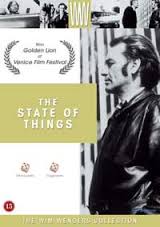
THE STATE OF THINGS
Portugal, 1982, 121 minutes, Black and white.
Patrick Bauchau, Paul Getty III, Viva Ruder, Samuel Fuller, Robert Kramer, Alan Goorwitz, Roger Corman, Isabel Weingarten, Rebecca Pauly, Jeffrey Kime, Geoffrey Carey, Camilla Mora.
Directed by Wim Wenders.
The State of Things is a personal statement about film-making by German director Wim Wenders, a world-known figure with his road films (King ot the Road) and explorations of German society (The American
Friend). He has also 'adapted a number of classics including Hawthorne1 s The Scarlet Letter. Moving to America in the mid-170s, he worked with Francis Ford Coppola on a private eye thriller based on the life and the stories of Dashiell Hammett, Hammett (1982). His experience of making the film and production interference disturbed him and made him critical of American film-making. The State of Things is his fictional - autobiographical portrayal of the contrast between European film-making and the financial stranglehold of American producers (with the gangster touch). The film is quite pessimistic in tone. The group of film-makers are in Portugal to do a remake of Alan Dwan's The Most Dangerous Man Alive. They have adapted it to a post-nuclear holocaust situation - and Wenders seems to be using the metaphor of this post-nuclear survival as a symbol of the film-making and the difficulties that he found.
Wenders film Paris, Texas won the Cannes Best Film prize in 1984.
1. The work of Wim Venders: his film statements, explorations, his interest in the classics? Theory of film-making? Comparisons with European styles and Hollywood styles? Industry, business? Art? The background of American gangsterism and pressures? The contrast with commitment to film art? Venders' acclaim?
2. The ironic title? Menders' dissatisfaction with the state of things? His use of The Survivors as a symbol for survival in The State of Things? The irony of the film The Survivors while the director dies?
3. The Survivors: the work of Alan Dwan as a B-budget film-maker with a reputation for entertaining films? The remake of his Host Dangerous Man Alive? The adaptation to a post-nuclear holocaust situation? The introduction, the disaster, the terrain, the sea, the wrecks, the mutants? The opening of the film and the revelation that it was a film being made? Wenders interest in futuristic science-fiction with the nuclear background? The budget, the art quality of the film, the possibilities? The contrast of visuals: the image of the film world with the real world? The importance of the Portuguese location photography? Portugal as a symbol of an inferior European economy, the contrast with American economy, symbols for film-making?
4. The other film references within the film: the book of The Searchers, John Ford's film and its screening in Los Angeles, the values of The Searchers - outcasts, racism, settlers, Americana? The use of Samuel Fuller with the background of his films and discussions of Forty Guns, the snippets of film? The references to Fuller's work, the appearance by Roger Corman, the admiration of Fritz Lang, the work with Francis Ford Coppola - and the criticism of him? The irony of the advertisement for Caveman over the parking lot in Los Angeles - a comment on Americans? The The admiration of Wenders for the movie world: films mirroring society, shapers of culture, their inttaversion, the film people sealed into their own film world - artistic or business? Wanders supplying clues for film buffs?
5. The black and white photography and the comments about the use of black and white? Life is in colour, black and white for realism? The attitude of the director and his art? The desire to make a personal film? The American loan sharks against black and white and wanting colour? The effect of black and white: the film of The Survivors, Portugal and its landscapes, the realism and unreal! sin of the hotel, the moods of the sea? Interiors? The streets and the town in Portugal? Los Angeles in black and white - and the memories of so many gangster films?
6. The score, its moods, the range of music, the ominous tone of the orchestration in Portugal, the electronic music, the contemporary music in Los Angeles? Alan Goorwitz's plaintive song about Hollywood - and its symbolic lyrics?
7. The international cast echoing the story? The use of celebrities? The German viewpoint, the European viewpoint, the attitude of the film buff? The attitude towards to United States? (And the making of the film in English?)
8. The problems of film-making: the writing and the story, the using , of scraps of film stock, the hold-ups, the need for the cash flow? The effect on writers, director, cast, crew? The reliance on Gordon and his raising the money, the dubious connections? His absence from Portugal? The growing anxiety, reactions, hopes? Dennis and his writing, and the revelation that he had put his money into the film? The director going to Los Angeles, the confrontation with Gordon, the smooth-talking lawyer and the freezing of funds, the laundering of gangster money? Gordon in his caravan - on the road, on the move? The director being shot? The tour de force ending of the film - and the irony of the director filming his assassins until he died? Atmosphere of desperation, boredom, relationships both casual and loving, suicide and murder? The film-maker's world symbolising the state of things?
9. The interplay of the characters: the director: the European film-maker, his American reputation, his action films? His interest in The Survivors? The use of Portuguese locations, atmosphere? Handling of the cast? Relationship with Joe the director of photography. Joe's crisis with the death of his wife? Seeing him again and finding out the truth in Los Angeles? His wife and his lack of passion? Giving the copy of The Searchers to the star? His handling of the stars, the crew? Dennis and his feelings? The decision to go to Los Angeles after the sense of tension in Portugal? Arrival in Los Angeles, the car park, driving, noise, sounds, the contrast with the old and the new world? His searching for Gordon? The secretary? The lawyer? The truth about the Mafia connections, the laundered money, the disgust at the film in black and white? Finding Gordon and his driver? The discussions, on the road, fleeing the gangsters, Gordon's song? His being shot - and filming his assailants? The cast: actors and actresses, their skills, stranded in Portugal, their interactions - the bar and the drinking, baths, talk, sexual relationships? How detailed the portraits of the characters - in themselves, in relationship to others, as enclosed in the world of film-making? The director's wife and her response, the child, relationship to the rest of the crew? Joe, the director of photography, his wise advice, the illness of his wife, the return to America? The lawyer in Los Angeles and his smooth talking? Gordon and Herbert in the van, Gordon on the run, his fears, cynicism about Hollywood - and the lyrics of his song?
10. The film as about the end of the world at the edge of the world? The use of the symbol of post-nuclear survival for the state of things about European and American film-making?
Published in Movie Reviews
Published in
Movie Reviews
Tagged under
Saturday, 18 September 2021 19:43
Shadow Conspiracy
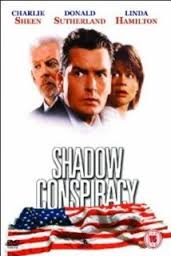
SHADOW CONSPIRACY
US, 1996, 98 minutes, Colour.
Charlie Sheen, Linda Hamilton, Donald Sutherland, Stephen Lang, Sam Waterston, Ben Gazzara, Nicholas Turturro, Theodore Bikel, Gore Vidal.
Directed by George Pan Cosmatos.
Shadow Conspiracy is an interesting if somewhat routine conspiracy thriller. It has a Washington setting and posits the hypothesis that the vice president and the chief of staff have lost faith in the American president and have set up a conspiracy to assassinate him. Information about politicians, their stances and corruption are monitored by a group of computer experts and one of these is an informer after all the others have been killed. The assistant to the president has the dilemma of exposing the conspiracy to the press and to expose his mentor who, it emerges, is the leader of the conspiracy.
Charlie Sheen looks sufficiently worried as the assistant to the president and spends a great deal of the time being chased. Linda Hamilton is a former lover and antagonistic journalist whose help he needs. Donald Sutherland is the chief of staff, Stephen Lang the assassin, Sam Waterston the president, Ben Gazzara the vice president. There is a momentary cameo by Gore Vidal as a politician who is being blackmailed to support a cause. The direction is by George Pancosmatos, a Greek director who made a number of Hollywood films including Cobra with Sylvester Stallone.
1. The popularity of this kind of conspiracy film? Washington conspiracy? Against the government? In the atmosphere of the mid-90s?
2. The Washington settings, the White House itself, the offices, the backrooms, computer centres? The media? The streets and the chases? Editing and pace for the chases? Excitement? The musical score?
3. The plausibility of the plot, the title, a conspiracy within the heart of government, the judgment of arrogance on the president in his second term, the righteousness of the conspirators? Their ruthlessness, resorting to assassination?
4. Bobby Bishop as the young assistant to the president, his being called in by Conrad, given an ultimatum to change the press perception of a document? His phone calls, manner of acting, the West Wing ruthless touch? His antagonism towards Amanda, especially at the press conference? His standover tactics with the congressman, persuading him to come on stage and deny his former story? The applause of the inner council for his efficiency? His meeting with the professor, the information about the shadow conspiracy, the professor shot and dying in his arms? The assassin chasing him? The drama of the chase, Bobby and his being elusive? The phone call to Conrad, the assassin present at the new rendezvous? His suspicions? His calling Amanda, promising to give her the story? His ringing the sub-editor, the arrangement to meet, the death of the sub-editor? The assassin in the paper building? The further chases? The entry into the White House, his persuading the guard to let him through, the casual approach? Hacking into the computer, the discovery that Conrad had given the authorisation for the death of the professor? The chase within the building? The realisation that the president was the target, his getting help, coming into the scene for the assassination, the model plane and its shooting, his pushing the president out of the way? His achievement, the happy ending with Amanda? Conrad killing himself?
5. Amanda, the past relationship with Bobby, her asking the question in the press conference, his going to her, her sharing in the search, the dangers? The happy ending?
6. The assassin, the opening with the computer group, killing them, the professor escaping? His shooting him in the street? His pursuit of Bobby? His going to his office, getting the information, the photos, going to the apartment and killing the professor's assistant? His entry into the site for the visit of the president, setting off the model plane, its mayhem, Bobby and his getting the balloons to fall on the model plane and its explosion? His leaping out shooting and his death?
7. Conrad, Donald Sutherland's dignity, his being Bobby's mentor and supporting him? Audiences not suspecting him of being the criminal? At the meetings, his influence with the group, with the president? His wanting to get Bobby back into the White House? The phone calls? The meetings? His computer being hacked into, the revelation of the truth? His ordering the assassination of the president? His watching, his not being able to kill Bobby, the plan going awry, his shooting himself?
8. The other conspirators, the vice president and his collaboration, his death? The military chief? The computer expert and his resources for surveillance to find Bobby and his car?
9. The picture of American politics, the president, his second term, the condemnation of being liberal and mad, the conspiracy group wanting to get the country back on track and feeling they had the right to do it, mouthing sentiments that they were at the service of the people? Bobby and his criticism of these stances?
10. The combination of conspiracy, assassination attempt, Washington politics and chases?
Published in Movie Reviews
Published in
Movie Reviews
Tagged under
Saturday, 18 September 2021 19:43
Star Crash
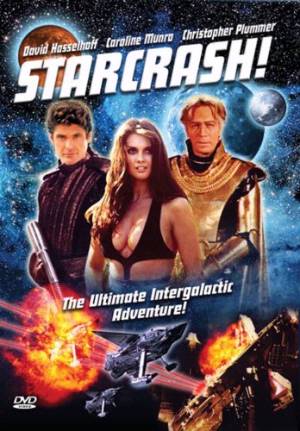
STAR CRASH
US, 1979, 94 minutes, Colour.
Marjoe Gortner, Christopher Plummer, Caroline Munro, David Hasselhof.
Directed by Luigi Cozzi.
Yet another derivative of Star Wars. These derivatives abounded at the end of the seventies, The Humanoid, The Shape of Things to Come. Even the 1979 James Bond film Moonraker followed the same pattern. This Canadian production is comic strip material. However, its special effects are better than some of the more cheaply produced Italian and American films. Marjoe Gortner is the star - not such a convincing hero. He contrasts very strongly with the guest appearance of Christopher Plummer as the good emperor of the galaxy. Entertaining material in its way using the quickly established conventions of the intergalactic warfare film
1. The popularity of the Star Wars derivatives in the late seventies? The impact of Star Wars, intergalactic warfare, heroism, good and evil on the cosmic scale?
2. The perennial appeal of science fiction, of space and its exploration, living in space, spaceware, good and evil and their confrontations?
3. The Canadian production and its values, its emphasis on special effects, the presentation of space, technology, robots? The mythical worlds explored?
4. The impact of the opening, the voyage, the difficulty of the red rays and the destruction of the expedition? The information given about the good and evil kingdoms in the galaxies? The establishment of the basic conventions and audience expectations?
5. The hero and heroine - their role as smugglers in space, their skill, capacity for moving their vehicles rapidly, their being caught, tried, the sequences of slavery with the overtones of the Roman Empire etc.? The irony of slavery in technological factories? The melodramatics of the rescue?
6. The evil empire, the emperor and his control, his secret weapons, hiding weapons in the galaxies? His henchmen, the traitor and his leading the hero and heroine on etc.? The easily seen evil and audience response to it?
7. The contrast with the good emperor - Christopher Plummer's style and presence? His audience. commissioning the hero and heroine, his search for his lost son, his arrival at the end, his putting all things right, his final assurances of peace? The inevitability of victory of good?
8. The importance of the tests: the Amazons and the overtones of those legends, the cave monsters? The range of climates - especially the snow? The themes of endurance by the hero and heroine?
9. The robot and his origins, his human characteristics, his conversation, his friendship, his helping the heroine in the snow? The inevitability of the presence of the entertaining robot?
10. The hero and his being a smuggler, skills, relationship with the heroine, his special powers, his not dying, his search, his heroism in rescuing the emperor’s son, his disappearance for another time? His weaponry and his skills?
11. The prince and his discovery, the sabotaging of the bad emperor's centre, the rescue, the confronting of dangers? His father arriving and the possibility of the destruction of the good empire?
12. The importance of the themes of dangers, rescues? Peace and hopes?
13. At what level was the film pitched? For what audience? How successful in what it set out to do?
Published in Movie Reviews
Published in
Movie Reviews
Tagged under
Saturday, 18 September 2021 19:43
Star in the Dust
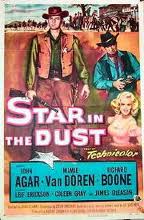
STAR IN THE DUST
US, 1956, 80 minutes, Colour.
John Agar, Mamie Van Doren, Richard Boone, Colleen Gray, Lief Erickson, James Gleeson, Paul Fix, Harry Morgan.
Directed by Charles F. Haas.
Star in the Dust is a small and routine western. It has a strong cast of character actors.
The film focuses on Sam Hall, in prison for shooting three farmers. The sheriff wants him hanged. So do the farmers. Others want him out – and Hall himself is plotting with his girlfriend to get him out while taunting the sheriff.
Meanwhile, in the saloon, men are betting whether he will be hanged or not.
The film has the expected action – and was directed by Charles F. Haas, prolific director of television material between 1950 and 1967 with a few small-budget cinema features like this and Showdown in Abilene.
1. The significance and tone of the title? Indication of themes of the law, the west? The focus on the character of the Sheriff and his antagonists?
2. How good a western was this? It is a ‘B’ western but has some pretensions to reputation. The contribution of colour, the fact that it took place on one day, the hanging framework of the screenplay, the creation of atmosphere
of the town, the variety of characters within the town? The contribution of the ballad and the fact that it punctuates the action?
3. The immediate introduction to the situation, the hanging and the preparations, the focus on Sam Hall and his imprisonment, the focus on the Sheriff and his clash with Sam Hall? The background of Hall’s employment and his murders, the background of the Sheriff living In the light and reputation of his father?
4. The characterization of Hall as evil, a murderer, lawless and without conscience? His attitude towards the Sheriff, his arrogance, attitude towards Nellie and help from her, his almost escaping, the irony of his being recaptured by Orval? The inevitability of his hanging and his acceptance of this? Did the ballad in any way glorify him? The exploration of this kind of gunman killer of the 19th century?
5. The character of Bill Jordan? The son of his father, his role as Sheriff, his reliance on his authority and doing his job according to the letter of the law? His wanting to remain unaligned in the clash between the ranchers
and the small farmers? The various manoeuvres which he tried? His encounter with the teacher at the classroom and their fight, the clash with the small farmers and yet their support? The complication of his engagement to Ellen, relationship to her, a lack of suspicions of George Ballard? His attitude towards justice, towards negotiation? The effect on him of being tricked be Ellen? His attitude towards confronting the various parties and the achievement of his purpose in hanging Hall? A credible western hero and upholder of the law?
6. The plot relied much on women and their influence. Comment on the three women and their roles.
7. Ellen as the attractive heroine, sister of the villain, the inevitability of her having to take sides, her love for bill, her regard for her brother? The motivation for her entering into the tricking of Jordan? Her final disillusionment with her brother and the clash with him on the roof? A saviour-figure? The contrast with Nellie? Nellie's strict upbringing, her reaction, her infatuation for Sam Hall? Her devotion to his, her desperation, especially in attempts to save him, encounters with Ellen and Nan Hogan? The background of Nan Hogan and her relationship to Ballard, her devotion to her husband and her fears for his safety, her entering into the plot to release Hall in order to save her husband? Her co-operation with the Sheriff and witness to the identification of Ballard's letters? The influence of women in the western town and these situations?
8. The characterisation of Orval and the Deputy? Their work on the scaffold, Orval wanting to help, his skill in recapturing Hall, the irony of the Deputy’s imprisonment? The fact that Orval was killed and the point that was made? These as the ordinary supporters of law and order?
9. The presentation of Ballard as the smooth-talking villain, his hold over his sister, his presumption in dealing with Jordan, his hold over Hall and his manipulations to get him? His relationship with the ranchers? The ranchers going to Hall and Hall being violent with them?
10. The presentation of the small farmers? The teacher and his power struggle to hold them? The contrast with Hogan and his impetuosity in leading the cattle men? Their converging on the town, Jordan’s facing the dilemma, the emerging of the truth?
11. The build-up to the climax In the town square, the two parties, the discovery of the truth, Ballard and his death? The hanging of Sam Hall?
12. How well were the typical western themes of law and order, good and evil, relationships worked out in this film?
Published in Movie Reviews
Published in
Movie Reviews
Tagged under
Saturday, 18 September 2021 19:43
Stanley/ 1972
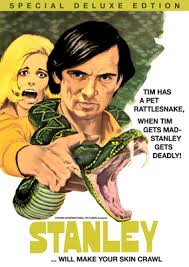
STANLEY
US, 1972, 108 minutes, Colour.
Chris Robinson, Alex Rocco.
Directed by William Grefe.
Stanley came out at the same time as a number of animal horror thrillers, preceding Jaws as well as the smaller-budget films like Food of the Gods and Empire of the Ants.
This time a young Seminole Indian played by Chris Robinson has a rattlesnake, called Stanley – and he induces the snake to avenge himself on all those who have wronged him. That is the basic plot – that is the style and it is a film for devotees of this kind of animal horror.
1. A good example of the animal horror genre? Appeal, interest, themes? Enjoyment of this kind of horror film?
2. The personal touch with the title focusing on Stanlay? The emphasis on Hazel? Their relationship with Tim? The madness and sanity of this personal focus on a snake?
3. How authentic were the atmospheres of Florida, colour, locations? How credible the characters, their background, social issues? Behaviour? Credible authenticity combined with American style grand horror?
4. Audience interest in and sympathy with Tim? The importance of the Vietnamese background, the effect of the war, the critique of American involvement and the effects of war? The effects of war brought back to America and destructive on society? Timls relationship to society, the Indian minority background and racist themes? His ecological concern? against cruelty to animals for commercial purposes? Tim as embodying these social themes? How interesting a character, as a person, his mental state? Good and bad aspects of his character? His enemies, his vindictiveness, his overbalance and cruelty, his final destruction? The thematic significance of such a character being destroyed?
5. Audience response to snakes and their visual presentation, the symbolism of snakes, their deadliness? The effect of the personalizing of Stanley and Hazel, family, offspring? Liking them? Sharing Stanley's vindictiveness and killing the villain, Hazel as victim? Stanley as an extension and symbol of audience violence and justice?
6. The portrayal of Tim at work, collecting the venom, his being bitten and saving himself? The positive value of his collecting serum? The contrast with Thomkins and his commercial greed?
7. The importance of Gloria and Sidney, strippers and exploiters? Friendliness, change of attitude and ugliness of Gloria’s new act of biting the snake's head? The inevitability of destruction of Gloria and Sidney? The visual portrayal of this, the audience justifying it?
8. Crail and Bob an extensions of Thomkins, villainy, Stanley's leading them to the quicksand and the execution? The character of Psycho and the explicitly mad vindictive killer? The fight with Tim? Stanley's intelligence and destruction of Psycho? Audience approval or not?
9. The build-up to filling Thomkin’s pool with snakes and his execution?
10. The relationship between Thomkins and his daughter, the attraction for Tim? Her rebelliousness against her father and going with Tim? The symbolism of Tim as an Adam in the primitive surroundings, wanting an Eve? The irony of the snake? The reversal and the destruction of Adam by the snake and the rescuing of Eve? The snake protecting Eve against Adam? The accident of the fire and the Eve and the Serpent having to leave the garden?
11. The thriller aspects combined with the credibility of the animal horror? Snakes and audience response, the success of the imagery?
Published in Movie Reviews
Published in
Movie Reviews
Tagged under
Saturday, 18 September 2021 19:43
Stagestruck
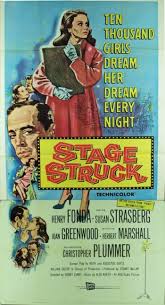
STAGESTRUCK
US, 1958, 95 minutes, Colour.
Henry Fonda, Susan Strasberg, Christopher Plummer, Herbert Marshall, Joan Greenwood.
Directed by Sidney Lumet.
A remake of the 1933 film Morning Glory for which Katharine Hepburn won her first Oscar in the role of Eva Lovelace. Newcomer Susan Strasburg, daughter of Lee Strasburg, manager of the Actors' Studio (which receives some ribbing in the screen play of this film), takes the Hepburn role. In the ordinary scenes she is quite good but in the acting, for example of Romeo and Juliet, she is not particularly convincing.
The film, made on location in Now York City, which is emphasized at the beginning of the film, was the second film made by director Sidney Lumet. He had already made Twelve Angry Men after moving from television and was to be a successful director throughout the sixties and seventies, especially with his adaptations of plays, for example Long Day's Journey Into Night, A View from the Bridge, The Seagull. He was also to make the effective Serpico and Dog Day Afternoon in the seventies as well as Network, Equus and The Wiz.
The film also introduces Christopher Plummer. However, he did not make many films until the sixties and seventies. The film is an interesting presentation of the theatrical world of Broadway and the strength of ambitions and people using one another for success. Henry Fonda is his usual sturdy self in the central role. Interesting theatrical drama.
1. The title and the connotations of the word? Its application to the theatre, to each of the main characters, indicating tensions, themes?
2. How evident was it that the film was based on a play? Was the film in any way ‘stagey’? The film was also updated from the thirties. Did the film have the contemporary atmosphere of the fifties?
3. The use of New York City for authenticity, the focus on Times Squarep Broadway, the actual theatres with the advertisements, the atmosphere of the streets, the atmosphere of the theatres and rehearsals, outdoor sequences like the discussion between Easton and Joe in the snow?
4. How was Eva Lovelace the focus of the film? The quality of Susan Strasburg’s performance and her ability to hold the film together? Her personality, her persona? Her name and the discussion with Hedges? Her ability to act, Susan Stranburg’s ability to act, for example the Romeo and Juliet sequence? Her explanation of her background. her dreams of the theatre, her fears? Her wanting to tell the truth about herself? Audience response to her push and her charm? Her arrival in Easton's office, her patter to Hedges, her exploiting opportunities, her pushiness? The response of the men in the office, the response of Rita? The importance of her rehearsal and audition and her overacting and failing? Her presentation of herself at the Village Voice? Her appearance at the first night, going to the party with Joe, setting her cap at Easton, the champagne, the recital, audience response, staying the night? Her hopes, her love, their being dashed by Easton and her response? Joe and his training her? Her final getting in to the theatre, her fears, triumph? What was the meaning of her being stagestruck, why?
5. What happened to her throughout the film? From her push, to her behaviour at the rehearsal, to using people and situations, being used by them? Love for Easton, affection for Joe and gratitude, fear? The possibilities of success and the dream way of achieving them? Joe's contribution, Easton’s? The finale and the triumph? Her final assessing of the situation with Joe and with Easton? Her future? Seeing her before the lights, acting, the applause? Her leaving the theatre, going to Sardi’s and the applause of the future? The success of a stagestruck girl?
6. The director's use of close-ups for character portrayal, drama? His staging of the excerpts from plays?
7. The insight into the world of the theatre, the American theatre, the role of the producer and his deals, the playwright and the director, actors and actresses and hits, auditions? Star quality, applause, tantrums?
8. Henry Fonda’s portrait of Easton? A benign and successful producer, the human touch, his fascination with Eva, ignoring her, fascinated by her performance of Romeo and Juliet, his falling in love with her, ignoring her and trying to buy her off with money, the encounter with Joe in the snow, his realization of what was happening as regards the rehearsals, his searching for her at the Village Voice, his willingness to submit himself to her in affection and love?
9. The contrast with Christopher Plummer's portrait of Joe? An a playwright, naive and enthusiastic, creative? His fascination with Eva, his helping her, the first night, the audition, the party? How much did he love her, how much did he use her for understanding the role in his play? How did Eva use him? His search for her at the Village Voice? Rehearsing her, the first night, her achievement and her rejection of him?
10. The contrast with Rita and her star quality and star tantrums? Her theatricality, the affectionate scenes with Easton and her kissing and arguing him down for contracts? Her behaviour as regards the play, as regards Joe? Her tantrums at the rehearsals?
11. Hedges showing the genial side of the theatre? The gentleman actor, the affection for Eva, success with her and helping her at the end?
12. The portrait of the theatre personnel, the officers, the business aspects, the jargon and the deals? The Village Voice personnel? The stage hands, costume and make-up?
13. The scenes based on theatrical writing with their strength of dialogue, personal clashes? The strength of the dialogue and its tensions?
14. Set sequences like Eva’s audition, the party and its chatter and her taking it over, the backstage sequences, the Village Voice performances, the discussion in the snow?
15. The impact of Eva’s acting - on the group, on the audience itself?
16. Themes of the theatre, ambitions, hopes, hurt, achievement and triumph?
Published in Movie Reviews
Published in
Movie Reviews
Tagged under
Saturday, 18 September 2021 19:43
Stage Door
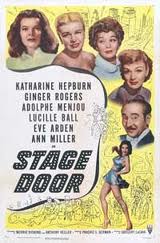
STAGE DOOR
US, 1937, 92 minutes, Black and white.
Katharine Hepburn, Ginger Rogers, Adolphe Menjou, Gail Patrick, Constance Collier.
Directed by Gregory La Cava.
Stage Door was nominated as best film for 1937 along with its director Gregory La Cava and Andrea Leeds as best supporting actress.
The film is a theatrical story, set in New York. It focuses on a boarding house where young aspiring actresses want to make it big on the stage. The film deals with the interactions between the women, humorous, bitter, gossipy.
The film has a very strong cast with Katharine Hepburn (already an Oscar winner for Morning Glory), Ginger Rogers who had made the headlines dancing with Fred Astaire and who was to win an Oscar in 1940 for Kitty Foyle, Lucille Ball, Eve Arden with her wisecracks, Ann Miller as the dancer, Gail Patrick and her aloofness, Andrea Leeds as the sweet young lead. Constance Collier also appears as a fading actress. The men are in the background but Adolphe Menjou is the producer. Other small roles are played by Jack Carson and Grady Sutton, Franklin Pangborne.
The film is based on a play co-written by Edna Ferber (Show Boat) and George S. Kaufman (The Man Who Came to Dinner).
1. How enjoyable a film? Its impact in the thirties, now? The reasons, for differences?
2. How evident that the film was based on a play? Theatre style? The black and white photography, the sound and the sets of the thirties?
3. How well did the film create and communicate the atmosphere of the thirties? New York City, the hostel for aspiring actresses, the world of the theatre, its hopes and cruelty? Characters as moulded by the atmosphere? Contributing to this atmosphere?
4. The world of the hostel and its ethos? The people running it, the reasons for the girls being there, their way of life, interactions with one another, hopes and fears and ambitions? The importance of the detail in re-creating, the hostel?
5. Why did the world of the theatre have such ambitions for the girls? As illustrated in the small jobs that they got - small parts, dance routines? What did the girls hope to achieve? How was this illustrated in each of their characters?
6. Jean as one of the central characters? Her wisecracking style, her own ambitions, her friendliness, her antagonism towards Terry, the reasons for the hostility, the accusations about the death, her final change of heart?
7. How well drawn were the minor characters in the hostel? How interesting were they as pictures of American women?
8. The reason for Terry coming to the hostel? The explanations of her background, wealth and society, her conversations with her father? Her aims in the theatre, standing on her own feet, her motivation?
9. The explanation of her success? The reason for her ambition and her drive? How much was it at the expense of others? How much was it success in her own right? The emotional impact of her final performance?
10. The contrast with Kay? her melancholy, her first success, her continuing failure, her niceness to the others, the sense of doom and her death?
11. What comment did the film make on theatre types in the person of Powell? The personality, his use of others, his use of Terry? How ugly a picture of the theatre manager and producer?
12. Themes of death, success, love and hate?
13. The atmosphere that the ending provided: with the reprise of the way the film started? The same stories over and over again?
Published in Movie Reviews
Published in
Movie Reviews
Tagged under